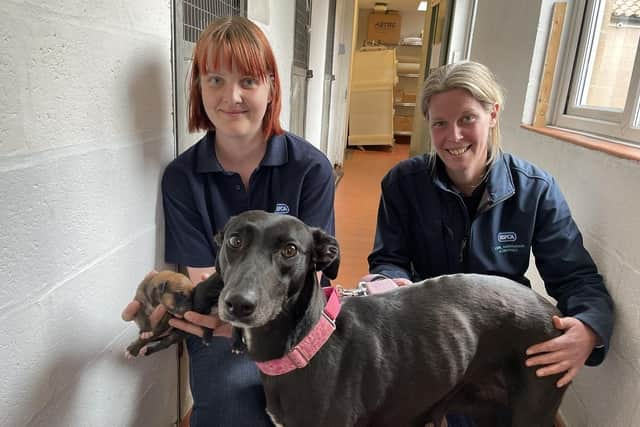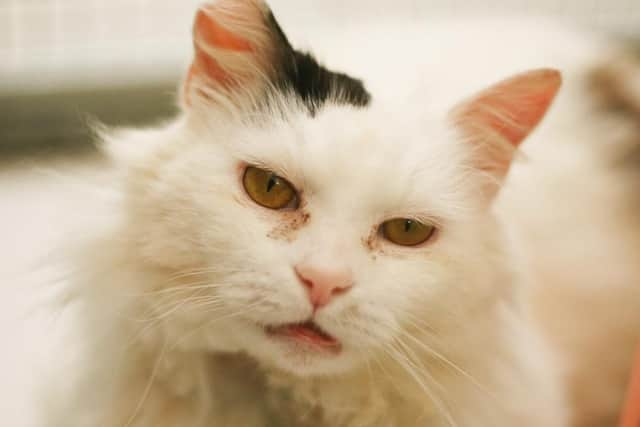Yorkshire animal rescues and charities plead to pet owners not to abandon their dogs and cats as they reach capacity amid cost of living crisis
and live on Freeview channel 276
The cost of living crisis is caused by a rise in inflation in the UK, as well as the economic impact of global issues including the 2022 Russian invasion of Ukraine and the Covid-19 pandemic.
The crisis has hit many people up and down the country with homeowners struggling to pay bills, petrol and general amenities due to a sharp increase in prices.
Advertisement
Hide AdAdvertisement
Hide AdBut many homeowners in the UK, particularly in the north, have pets.


With the added financial challenges of vet care, insurance and general upkeep, pet owners are left sending their beloved dogs and cats to animal charities and rescue centres.
This has been a particular issue in Yorkshire as many local charities and rescues are struggling to keep up with the number of dogs, cats and other animals being sent their way by owners who are struggling to look after their pets.
These organisations told the Yorkshire Post they are now reaching full capacity as their kennels and cubicles are being filled every week.
Advertisement
Hide AdAdvertisement
Hide AdDog rescue charity, Miss Mollies Rescue, based in Harrogate, has even run out of kennel facilities completely.


According to the charity, contributing factors include the cost of living crisis and a surge of people buying, adopting and breeding dogs during Covid lockdowns in 2020.
Jeanne Thompson, owner of the Harrogate charity, said: “We no longer have kennel facilities and are getting requests on a daily basis to take dogs in. Thankfully we have been relying on foster homes for the ones we are able to help and finding them new homes quickly.
“It is getting more and more difficult for people to cope and many owners have ongoing medical issues as a result of Covid and the worry over the cost of living.
Advertisement
Hide AdAdvertisement
Hide Ad“We are helping where and how we can with making sure dogs in need are getting food and veterinary treatment when needed.
“Fingers crossed things will start to improve quickly.”
Branch manager at RSPCA York, Peter Gorbert, claims that this is a national issue and abandonment of pets is a key factor.
He said: “We’re currently operating at capacity with all of our 30 kennels and 24 cat cubicles filled with animals waiting to find their forever homes or being rehabilitated ready to go up for rehoming.
“It’s a national issue as well with waiting lists for RSPCA animal spaces reaching triple figures for dogs.
Advertisement
Hide AdAdvertisement
Hide Ad“This is partly due to the worrying increase in the number of animals being offered up for adoption or abandoned, and we only expect this to get worse as we move into winter and the increase in energy bills really starts to hit home for people.
“It's also going to be a very difficult winter for animal centres like ours as we're seeing our operating costs shooting up as well.”
Mr Gorbert told the Yorkshire Post their energy bills doubled last year and they were worried for the future as prices continue to rise.
“Independent charities like the RSPCA York also rely really heavily on donations from individuals and many of our supporters will also be worrying about how they can pay their bills”, he added.
Advertisement
Hide AdAdvertisement
Hide Ad“Unless something happens soon a lot of charities like us are going to be completely unable to continue.”
Not only are a surge of owners in Yorkshire sending their pets to charities and rescue centres amid the cost of living crisis, many of these charities are finding themselves rescuing a large number of animals who have been abandoned in parks and at the side of roads.
Danni Shirreffs, centre manager at Blue Cross in Thirsk, said that the reality of abandoned pets would be unusual for them before the crisis, but now they are seeing this happen every week.
She said: “We plead to any pet owners struggling to cope to contact us or another charity and not abandon their pets.
Advertisement
Hide AdAdvertisement
Hide Ad“We do understand, this is a really difficult time financially and people forced to give up their pet are not alone.
“We really are here to help and not judge anyone, it is better for us to know about the background of a pet to find them the best new home and we cannot do this if a pet is abandoned.
“Pets also may have to spend more time in the kennels while we assess them, which most pets do not enjoy.
“At Blue Cross here in Thirsk we are finding ways to help pet owners in any way we can. We don’t have a pet food bank here at the centre but we are donating pet food to local human food banks.”
Advertisement
Hide AdAdvertisement
Hide AdCentre manager at Blue Cross in Sheffield, John Cahill, revealed that the team at the centre admitted abandoned Guinea pig babies, who had been left in a park last month, and a cat, who was abandoned outside the centre with a broken hip.
He said: “We recognised there was an increasing need to help pet owners on a low income back in 2020, which is why we set up our pet food bank.
“Sadly, we admitted a pair of abandoned Guinea pig babies found in a park last month and just a fortnight later a young cat was abandoned outside our centre with a broken hip.
“Happily, he is recovering now but he must have been in a lot of pain and very stressed at being left all alone. We are seeing more and more pets admitted with injuries and health issues. This can be extremely dangerous and leave pets in discomfort or even agony.
Advertisement
Hide AdAdvertisement
Hide Ad“Please contact your vet as soon as you think your pet is unwell or injured as the sooner they can get treatment the more effective it will be.
“Anyone who can’t afford the treatment can get in touch with us to help find their pet a new home if that is the best outcome for both owner and pet.”
Sara Atkinson, chief executive officer and founder at Yorkshire Cat Rescue, based in Keighley, said: “The owners who are having to part with their animals can’t afford it, it’s horrendous. The other side of the coin is that fewer people are coming forward to adopt, particularly the older and more difficult cats and we’re still seeing a reduction in the number of people wanting to adopt our cats, so that means that these cats at our centre are there for longer.
“For some people [the problem is] being unable to afford to feed them, for other people it’s vet bills and what happened during the pandemic when many people didn’t get their cats neutered possibly because they couldn’t or possibly because they couldn’t afford to.
Advertisement
Hide AdAdvertisement
Hide Ad“We had an event last year where we raised over £20,000 - it was fantastic. However, this year we held the same event and we’re struggling [with donations]. And the people who regularly donate are having to stop or reduce their donations because they’re having bigger bills.
“If we get a bill from the vets and they say this cat needs its teeth out, it’s going to cost you £800, we’ve got to find that. We’ve got to look after them and then we’ve got to pay our electricity bills and our electricity has gone up for the period from November [2021], we had our quote last week, from £3,500 approximately last year to an estimated £14,500. We’re not a massive charity, so we’ve got to find the bills we have to pay.”
Good Life Dog Rescue, a charity based in West Yorkshire, has also been struggling to keep up with the number of strays they’ve had to look after and rehome.
The main issue here is that stray dogs often have behavioural problems that need rehabilitation. This needs resources which are declining due to the number of dogs being sent over to them in comparison with the rapidly decreasing numbers of people wanting to adopt.
Advertisement
Hide AdAdvertisement
Hide AdVictoria Bastow at Good Life Dog Rescue said: “What’s happening is when one dog gets rehomed another dog takes up that place. But I mainly take from the local stray kennels in Yorkshire so that covers Wakefield, Leeds, I do help a lot of the dogs in the Nottinghamshire area, the strays.
“I think at the moment people seem to be under the impression that people are wanting to just get rid of pets but a lot of dogs are already abandoned and a lot of these have been really young dogs.
“Some of them have been more for breeders in lockdown where, I’m sure some people have had the best of intentions, they’ve not done any training or offered any guidance for these dogs. So what we’ve got now is adolescent dogs with behavioural problems that they’re wanting to rehome. I think people are so desperate to rehome these dogs and that’s where the stray dogs are coming from. It’s a very difficult situation.”
According to Ms Bastow, there are many contributing factors to the current crisis her charity is facing.
Advertisement
Hide AdAdvertisement
Hide Ad“Contributing factors are: the cost of living crisis, however, what I will say is that it doesn’t cost that much to feed a dog, the costs come from veterinary bills,” she said.
“A lot of the dogs that are already abandoned at the local council kennels, they have medical issues that are in need of surgery. Then I suppose you’ve got the situation where people have passed away who have got dogs and family members are not able to help them, they also need help still.
“The sheer volume of strays and the sheer volume of people who are wanting to surrender dogs has resulted in the kennels becoming so full that they are unable to accept anymore dogs in.
“I do think another huge contributing factor is during lockdown, since people didn’t have anything to do, a lot of people went out and bought dogs. The demand was high. It is now at a crisis point.”
